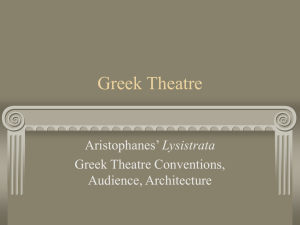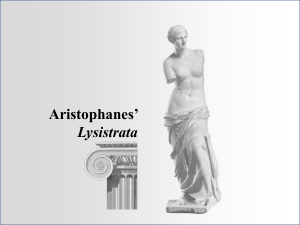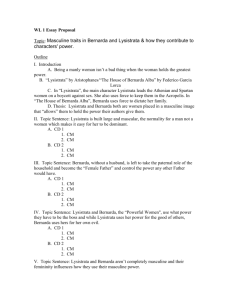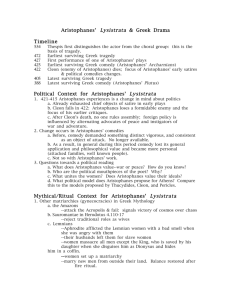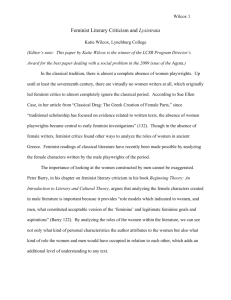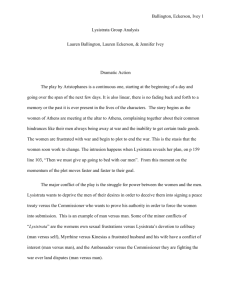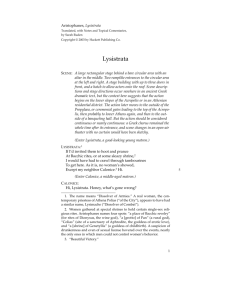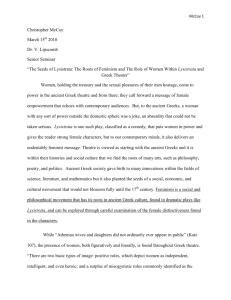Lysistrata - bhsvceenglish
advertisement
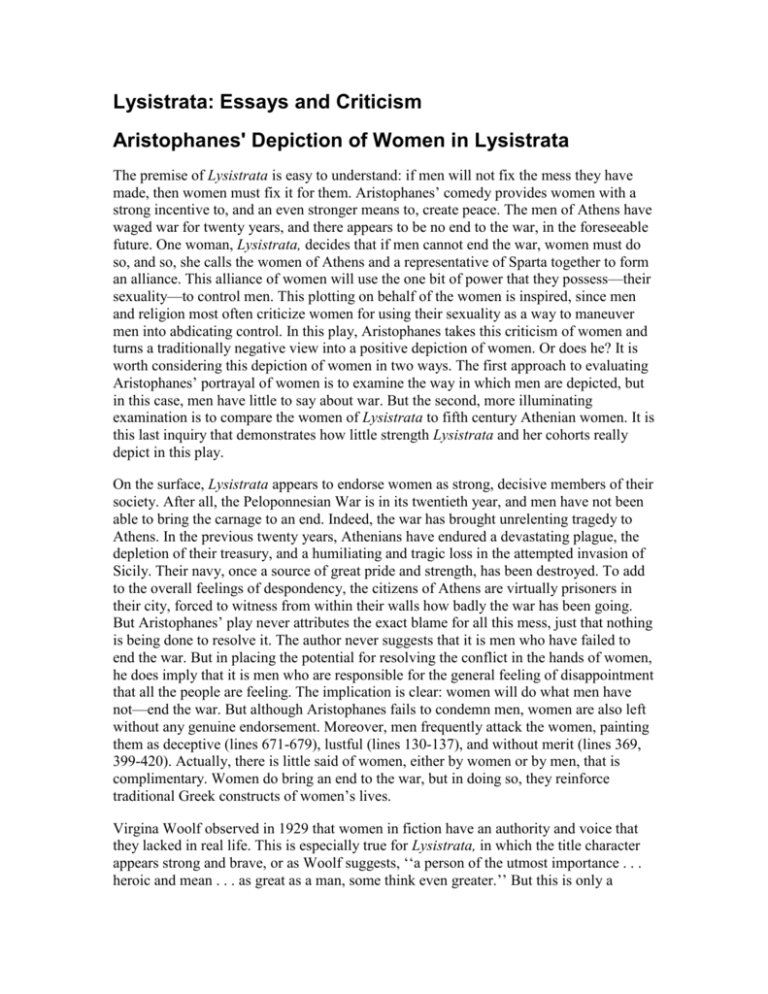
Lysistrata: Essays and Criticism Aristophanes' Depiction of Women in Lysistrata The premise of Lysistrata is easy to understand: if men will not fix the mess they have made, then women must fix it for them. Aristophanes’ comedy provides women with a strong incentive to, and an even stronger means to, create peace. The men of Athens have waged war for twenty years, and there appears to be no end to the war, in the foreseeable future. One woman, Lysistrata, decides that if men cannot end the war, women must do so, and so, she calls the women of Athens and a representative of Sparta together to form an alliance. This alliance of women will use the one bit of power that they possess—their sexuality—to control men. This plotting on behalf of the women is inspired, since men and religion most often criticize women for using their sexuality as a way to maneuver men into abdicating control. In this play, Aristophanes takes this criticism of women and turns a traditionally negative view into a positive depiction of women. Or does he? It is worth considering this depiction of women in two ways. The first approach to evaluating Aristophanes’ portrayal of women is to examine the way in which men are depicted, but in this case, men have little to say about war. But the second, more illuminating examination is to compare the women of Lysistrata to fifth century Athenian women. It is this last inquiry that demonstrates how little strength Lysistrata and her cohorts really depict in this play. On the surface, Lysistrata appears to endorse women as strong, decisive members of their society. After all, the Peloponnesian War is in its twentieth year, and men have not been able to bring the carnage to an end. Indeed, the war has brought unrelenting tragedy to Athens. In the previous twenty years, Athenians have endured a devastating plague, the depletion of their treasury, and a humiliating and tragic loss in the attempted invasion of Sicily. Their navy, once a source of great pride and strength, has been destroyed. To add to the overall feelings of despondency, the citizens of Athens are virtually prisoners in their city, forced to witness from within their walls how badly the war has been going. But Aristophanes’ play never attributes the exact blame for all this mess, just that nothing is being done to resolve it. The author never suggests that it is men who have failed to end the war. But in placing the potential for resolving the conflict in the hands of women, he does imply that it is men who are responsible for the general feeling of disappointment that all the people are feeling. The implication is clear: women will do what men have not—end the war. But although Aristophanes fails to condemn men, women are also left without any genuine endorsement. Moreover, men frequently attack the women, painting them as deceptive (lines 671-679), lustful (lines 130-137), and without merit (lines 369, 399-420). Actually, there is little said of women, either by women or by men, that is complimentary. Women do bring an end to the war, but in doing so, they reinforce traditional Greek constructs of women’s lives. Virgina Woolf observed in 1929 that women in fiction have an authority and voice that they lacked in real life. This is especially true for Lysistrata, in which the title character appears strong and brave, or as Woolf suggests, ‘‘a person of the utmost importance . . . heroic and mean . . . as great as a man, some think even greater.’’ But this is only a fictional construct, and not the reality for women in ancient Greece. Thus as Woolf points out, women in literature exist in an imaginary, fictional world, where they are important, but in the real world, women are completely insignificant. In ancient Greece, women were not in control of their sexuality, and few men would have been willing to abdicate their desires to those of women. In the real Greek world, women were property, purchased through marriage or purchased through prostitution, but always, they were subordinate to men. In an examination of the sexual hierarchy present in 5thcentury B.C. Greek life, Brian Arkin suggests that the way people behave sexually in a culture, is determined by what society finds acceptable. To illustrate, he notes that in ancient Greek culture, society was ‘‘organized to meet the needs of the adult male citizen,’’ who dominated the way society functioned. This meant that males were in control of sexual expression, and as Arkin notes, ‘‘sex acts [were] not mutual,’’ since ‘‘in masculine discourse sex is something that you do to somebody.’’ To extrapolate from Arkin’s work an application to Aristophanes’ play, means that Lysistrata’s actions had no basis in reality. To put it briefly, women did not deny men sexual favors. Aristophanes’ audience would not see Lysistrata’s actions as anything but broad farce or entertaining slapstick. Since women were routinely excluded from Greek society, and men, in general, had a low opinion of women’s intelligence, there would have been no reason for Lysistrata to attempt reason; sex was the only weapon that Aristophanes could give her. But in giving her this weapon, he makes her choices, and those of the women who join her, laughable. Clearly that was his intention, but he might also have hoped to point out that men, who did have an authority denied to women, should be ashamed of their inaction, especially when faced by a fictional woman’s attempt to bring peace. Arkin is also concerned, as was Woolf, that women lacked an authentic voice on the stage: Greek men effectively silenced women by speaking for them on those occasions when men chose to address significant words to each other in public, in the drama, and they required the silence of women in public in order to make themselves heard and impersonate without impediment. Women lacked a forum to speak out against the war, but Aristophanes could give voice to his own outrage by appropriating a woman’s voice. Thus Greek women appeared to have an authority that they lacked in their own lives. In a sense, they were denied existence in their society twice, once by the cultural and societal rules that made males domi nant, and once by the theatre, that usurped their lives, so that the playwright might give voice to his own agenda. On stage, Lysistrata might enter the world of men and conquer that world, but this could not ever happen in reality, as Arkin mentions. Women might grow tired of the deaths of their men, but they would never publicly protest the war. There was only one forum available to women, where they might publicly comment on the war, and that was at the graves of their husbands, sons, and brothers. Women were expected to grieve properly, both as a sign of love and obedience to the men in their lives, but also, as a signal that they supported their society, and by extension, their government. This determination of proper grieving was so important, that the Athenian general, Pericles, spoke of this obligation at the first of the public funerals held after the Peloponnesian War began in 431 B.C., in which he addressed his comments to the women who had come to mourn. The historian, Thucydides, reported that Pericles told the women: If I must recall something about the excellence of those women who will now be widows, I will point out everything with brief advice. Great is the glory for you not to become worse than your innate nature, and hers is the great reputation whose fame, whether for excellence or blame, is spread among the males. Thus, Pericles admonishes the women to grieve properly, but to remember that in their grief, they still must support their city’s efforts to win the war. In an analysis of these lines, William Blake Tyrrell suggests that Pericles ‘‘was trying to fashion in the context of a funeral and mourning the dead the kind of women he needed for success.’’ At the start of another long war, the women of Athens must have been worried about the effect war would have on their homes and marriages. Women in ancient Greece had a prescribed formula for mourning, which required that women give voice to their anguish. Women may be opposed to the war, but they could not voice that opposition, nor could they choose to protest silently. Tyrrell notes that ‘‘silence among women over the dead would be the worst of calamities.’’ Women would be criticized if they did not mourn properly, but Tyrrell suggests that Pericles’ words were not just intended for the widows who had come together to bury their husbands at this first funeral; instead, they were intended for the women, who would be called upon to repeat this ceremony over the course of many years of war. Mourning was women’s work, and so it was appropriate that Aristophanes should have a woman grow tired of this work. Lysistrata tells the audience that there have been too many deaths, too many young men lying dead from this war. Her lament at all this death is the only recourse open to her. In expressing her grief, Lysistrata does come closest to depicting the real Greek woman of 5th-century B.C. Athens. In contrast, the women’s lament at their sexual deprivation is little more than male fantasy. There is little in Lysistrata that tells the audience of women’s lives; but, then, Aristophanes’ audience would have little interest in listening to what women had to say. To get the audience’s attention, the playwright needed to make the audience laugh at the war, and there is little about twenty years of war that can elicit humor. The bawdiness of sexual humor entertains the male audience, even if it creates a fiction of women’s lives. Source: Sheri E. Metzger, in an essay for Drama For Students, Gale, 2001.

